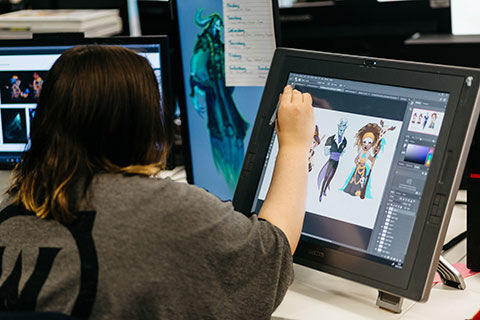
Feature Film Development - MA
Currently viewing course to start in 2025/26 Entry.
MA Feature Film Development will help you to understand what is required to make sure a major film is ready to be pitched to investors. You’ll learn all about the extensive pre-production activities all big-budget movies currently go through before they are green-lit. You’ll be taken through each stage of pre-production development to navigate, understand and avoid common problems....
- Level Postgraduate Taught
- Study mode Full Time
- Award MA
- Start date September 2025
- Fees View course fees
- Subjects
- Location City Centre
This course is:
Open to International Students
Overview
MA Feature Film Development will help you to understand what is required to make sure a major film is ready to be pitched to investors. You’ll learn all about the extensive pre-production activities all big-budget movies currently go through before they are green-lit. You’ll be taken through each stage of pre-production development to navigate, understand and avoid common problems.
MA Feature Film Development is suitable for Directors, Producers, Editors, Film Makers, Screenwriters, Directors of Photography, Concept Artists, Production Designers, Art Directors, Animators, Technical Directors, Story Artists, & Pre-Visualisation Artists looking to start or further a career in feature film.
This course is part of Birmingham City University’s Film Futures suite, designed with industry to reflect the growing need for highly skilled film graduates who can fulfil roles within the international film industry. Focusing on film development, pre-production, story art and pre-visualisation, you’ll become part of a vibrant and multidisciplinary film community.
What's covered in this course?
You will create, as part of a team, a full feature film story and pre-visualisation reel, demonstrating all the film's narrative and action elements. You will learn how to workshop the essential narrative from a screenplay in order to create a believable, immersive animatic that plays out the core story in full, including all key performance and action components.
How you will learn
You will take part in story workshops, extracting key structural elements from a narrative structure and iteratively develop action and performance staging through a multi layered story process. This will help you gain an understanding of character arcs and resistances essential to immersive believability.
You will learn how to make a story and pre-visualisation reel that grabs an audience and takes them on a believable journey. You will gain experience working within a pre-production team, obtaining a unique perspective of feature film development pipelines - how it is project managed and implemented within milestone scheduling.
Practical Application
During the course your contribution to the pipeline will become your ‘portfolio of practice’ showcasing your specialism and team skills, therefore proving your professionalism.
The assignments reflect real world pre-production practices and are designed to develop the key skills that are necessary to work in the international film industries.
You’ll have access to industry standard software, utilised by major film studios.
As a classically trained actor, the MA Feature Film Development course has given me the confidence to explore my creative potential as a writer and director. I have learned how to create, package and pitch a project, as well as understand the fundamentals of writing and structure. Working collaboratively has been a valuable experience and whilst I still have much to learn, this course has made me feel part of a community where I can continue to develop my skills.
Dane Foxx, MA Feature Film Development graduate
Why Choose Us?
- A cutting edge, one of a kind course, unique to Birmingham City University.
- Opportunity to secure an MA whilst working with world leaders in film development.
- The course has been developed with industry to ensure it provides the skills and knowledge you’ll need to work in the film industry, here in the UK and overseas.
- Teaching is delivered by industry practitioners and experienced academics.
- No exams! Coursework assignments that reflect industry practice.
Similar Courses
OPEN DAY
Join us for an Open Day where you'll be able to learn about this course in detail, chat to students, explore our campus and tour accommodation. Booking isn't open for this event yet, register your interest and we'll let you know as soon as booking goes live.
Next Event: 28 June 2025
Entry Requirements
Essential requirements
Applicants are expected to have:
- A background in film-making alongside a portfolio and show reel demonstrating your best work.
- Core Art skills, including drawing, anatomy, composition, value and colour theory.
- Skills within 2D and 3D software.
- Animation skills, focused on performance.
A degree in art, design, graphic, visual communications, animation or related discipline is desired but not essential.
You may be required to demonstrate your suitability via an interview or submission of a course proposal. Interviews will take place in person or via Skype/telephone.
Applying with international qualifications
See below for further information on applying as an international student.
If you have a qualification that is not listed, please contact us.
Fees & How to Apply
UK students
Annual and modular tuition fees shown are applicable to the first year of study. The University reserves the right to increase fees for subsequent years of study in line with increases in inflation (capped at 5%) or to reflect changes in Government funding policies or changes agreed by Parliament. View fees for continuing students.
Award: MA
Starting: Sep 2025
- Mode
- Duration
- Fees
- Full Time
- 1 year
- £10,820 in 2025/26
- Full Time
- 18 months (including Professional Placement - see below*)
- £11,900 in 2025/26
International students
Annual and modular tuition fees shown are applicable to the first year of study. The University reserves the right to increase fees for subsequent years of study in line with increases in inflation (capped at 5%) or to reflect changes in Government funding policies or changes agreed by Parliament. View fees for continuing students.
Award: MA
Starting: Sep 2025
- Mode
- Duration
- Fees
- Full Time
- 1 year
- £18,600 in 2025/26
- Full Time
- 18 months (including Professional Placement - see below*)
- £20,460 in 2025/26
*Professional Placement option
The Professional Placement version of the course is optional and is offered as an alternative to the standard version of the course.
This will allow you to complete a credit bearing, 20 week Professional Placement as an integral part of your Master’s Degree. The purpose of the Professional Placement is to improve your employability skills which will, through the placement experience, allow you to evidence your professional skills, attitudes and behaviours at the point of entry to the postgraduate job market. Furthermore, by completing the Professional Placement, you will be able to develop and enhance your understanding of the professional work environment, relevant to your chosen field of study, and reflect critically on your own professional skills development within the workplace.
You will be responsible for finding and securing your own placement. The University, however, will draw on its extensive network of local, regional and national employers to support you in finding a suitable placement to complement your chosen area of study. You will also benefit from support sessions delivered by Careers+ as well as advice and guidance from your School.
Placements will only be confirmed following a competitive, employer-led selection process, therefore the University will not be able to guarantee placements for students who have registered for the ‘with Professional Placement’ course. All students who do not find a suitable placement or do not pass the competitive selection process will be automatically transferred back to the standard, non-placement version of the course.
Personal statement
You’ll need to submit a personal statement as part of your application for this course. This will need to highlight your passion for postgraduate study – and your chosen course – as well as your personal skills and experience, academic success, and any other factors that will support your application for further study.
If you are applying for a stand alone module, please include the title of the module you want to study in your Personal Statement.
Not sure what to include? We’re here to help – take a look at our top tips for writing personal statements and download our free postgraduate personal statement guide for further advice and examples from real students.
Course in Depth
Modules
In order to complete this course a student must successfully complete all the following CORE modules (totalling 120 credits):
The purpose of this module is to give You the opportunity to experience the challenge of working within a Story and Pre-Visualisation development team by completing the initial research and concept stages of a Feature film development.
The purpose of this module is for you to develop a ‘Pre-Production asset pack’. You will build a detailed development structure and production plan within the following areas.
Design – To enhance the design process and establish a more refined art-style for the pre-production process. This will include more detailed mood boards, refined concept designs for both characters and environments and Production illustrations for key scenes.
Writing - To explore ‘show don’t tell’ methods within story structure opens narrative holes or blockers, or suggest much more effective and entertaining ways to develop story structure. It is important for the story development team to contribute to the writing process within this stage of the development.
Story – To iterate block storyboards focusing on 3 major scenes within the film. Developing one into a full animatic, setting the style and performance quality levels required for the future development.
Production – To formulate a detailed pre-production schedule and asset breakdown by outlining key deliverable milestones within a project management methodology. To create an initial Forecast budget for Production (based on the 3 key scenes within the Pre-Production asset pack)
The purpose of the module is to enable you to undertake a sustained, in-depth and theoretically informed research project exploring an area that is of personal interest to you. It is important that we can support you appropriately, so you will be guided towards choosing a research topic which is relevant to your discipline and in which your lecturers have expertise. The outcome may take the form of a written dissertation or a practical outcome with accompanying reflective, critical and contextual material. The main consideration when choosing your topic is that it must be relevant to your programme and you should consider the relevance of this topic to your future academic or professional development.
In order to complete this course a student must successfully complete at least 60 credits from the following indicative list of OPTIONAL modules:
It’s all about you! This module is centred around you and your personal and professional development. You will be the ‘Creative’ and the ‘Content Producer’ in the ideation, development, production and delivery of your own digital marketing assets.
This module provides an in-depth look at a major crux for the film industry: film festivals. Film festivals play a part in the financing, distribution and marketing of independent films and therefore the study of them is a core part of the overall. The present module will give students an understanding of the importance of film festivals to the industry, and give them insight into the skills needed to mount a successful marketing and public relations strategy at a festival.
The focus of this module is to give students the opportunity to experience the challenges of completing a Feature film development ‘Asset library’ that will be implemented in the production stage of creating a fully immersive Feature film story and pre-visualisation reel that contains either a ‘scene slice’ or has a ‘teaser’ reel to promote the final look and feel of the project.
In this module you will create discipline specific ‘Production ready Assets’ for a Feature film story reel, Pre-Visualisation and scene slice/teaser reel to professional standards.
This module will give students a thorough grounding in the skills necessary to successfully plan and carry out a film marketing strategy. The module will specifically examine the role of the distributor and the ways in which distributors market films from strategizing, through to planning budgets and implementation.
Core modules are guaranteed to run. Optional modules will vary from year to year and the published list is indicative only.
Download course specification
Download nowCourse Structure
During the year, you will study five taught modules over 3 semesters, culminating in a final group module.
Teaching methods may include practical sessions, lectures and group debates, featuring input from both University staff and guest lecturers from industry, providing you with a wide range of practical knowledge and insight.
On the course, you'll be taught by established industry professionals with a wealth of expertise and enthusiasm, who are experienced at recognising and responding to the rapidly changing demands within the industry.
Classroom activities
During your studies where appropriate, there may be practice-based opportunities to engage with a regional film festival such as Cine-Excess - an annual international film festival and conference on global cult film cultures and Flatpack Film Festival, a Birmingham-wide experimental film festival celebrating cinematic and audio-visual invention as well as other global film festivals such as Cannes, AFM and Annecy.
Employability
Enhancing your employability skills
Courses within the School of Games, Film and Animation are built upon workplace simulation and industry-standard work, ensuring you behave less like a student and more as a professional, gaining the workplace experience and attributes you need. The aim is to produce confident, work-ready graduates.
At the end of your studies you’ll complete a Major Project. This project may lead you to working directly with a client depending on individual aspirations. This direct contact will give you the experience, confidence and freedom to put into action all you’ve learned on your studies. Aligned with this course-specific experience, you will also have access to a range of support staff and services from the University’s Careers Service, who can help with:
- Reviewing CVs, covering letters and application forms
- Career planning and decision making
- Preparing for interviews and assessment centres
- Developing portfolios
- Networking with employers
- Advice about self-employment and entrepreneurship
Placements
Semester Three, which is the Major Project, is a live studio activity, where all MA Feature Film development students combine into a team to create a full story and pre-visualisation reel, including a scene slice or teaser.
You will have feedback on your work from major studio partners helping you to guide your contribution towards the Major Project and ready it for a live pitch process to international studios, Producers and Distributor.
The experience achieved within this in-house placement is a demonstration of a live development and is valued by industry partners.
International
Birmingham City University is a vibrant and multicultural university in the heart of a modern and diverse city. We welcome many international students every year – there are currently students from more than 80 countries among our student community.
The University is conveniently placed, with Birmingham International Airport nearby and first-rate transport connections to London and the rest of the UK.
Our international pages contain a wealth of information for international students who are considering applying to study here, including:
- Details of the entry requirements for our courses
- Some of the good reasons why you should study here
- How to improve your language skills before starting your studies
- Information relevant to applicants from your country
- Where to find financial support for your studies.
Facilities & Staff




The College of Digital Arts is based in the Curzon Building, a £63 million development, located on our City Centre campus.
We help you learn a specific discipline such as digital marketing, programming or art and put that discipline into practice by offering flexible teaching space, dedicated development studios and open access work areas for group projects, as well as course-specific facilities.
Our staff
Shaun Magher
Course Director BA (Hons) Digital Animation, MA Feature Film Development
Shaun has spent 30 years working as a Director, Creative Director and Animation Director within the UK and International Film and Television industries. A graduate from St Martins school of Art (1985) and the National Film and Television school (1989).
More about Shaun












